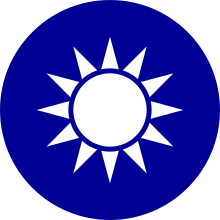Tung Hsiang-lung
| Tung Hsiang-lung 董翔龍 | |
|---|---|
| 1st Minister of the Veterans Affairs Council of the Republic of China | |
| Incumbent | |
| Assumed office 1 November 2013 | |
| Preceded by | Position established |
| 14th Minister of the Veterans Affairs Commission of the Executive Yuan of the Republic of China | |
| In office 1 August 2013 – 31 October 2013 | |
| Preceded by | Tseng Jing-ling |
| Succeeded by | Position abolished |
| 4th Commander of the Republic of China Navy[1] | |
| In office May 2011[2] – 1 August 2013 | |
| Preceded by | Kao Kuang-chi |
| Succeeded by | Chen Yeong-kang[3] |
| 6th Commander of the Republic of China Combined Logistics Forces | |
| In office 1 November 2008 – 15 May 2011 | |
| Preceded by | Kin Nai-chie |
| Succeeded by | Wu Yo-ming |
| Personal details | |
| Born | 21 September 1952 (age 62) |
| Nationality | |
| Alma mater | Republic of China Naval Academy United States Naval Institute Northwestern University Naval War College |
| Military service | |
| Allegiance | |
| Service/branch | |
| Years of service | 1974–2013 |
| Rank | |
| Battles/wars | Third Taiwan Strait Crisis |
Tung Hsiang-lung (Chinese: 董翔龍; pinyin: Dǒng Xiánglóng) is a politician in the Republic of China (Taiwan). He used to be the Commander of the Republic of China Navy (ROCN) from 2011 to 2013, and now currently serves as the Minister of the Veterans Affairs Council (VAC) since 2013.[4][5]
ROC Minister of the Veterans Affairs Council
Subsidies for ROC veterans with PRC nationality
In early October 2013 during a legislative session, Tung said the VAC will stop issuing subsidies to ROC veterans that are found to hold PRC citizenship, citing the amendment to article 27 of the Act Governing Relations between the People of the Taiwan Area and the Mainland Area that was passed in March 2004. He added that the VAC had found a total of 12 veterans who currently reside in Mainland China and hold PRC nationality. However, if those 12 veterans give up their PRC nationality and apply to reinstate their ROC nationality in the future, they could again apply for the annual subsidy from the VAC.
The VAC issues subsidies only for those veterans in dire financial needs where their income is below the average household income. Currently there are around 60,000 out of 400,000 veterans in Taiwan which are eligible for the monthly benefit.[6]
Retired ROC generals attending 90th Whampoa Military Academy anniversary in Mainland China
Commenting on the vast number of retired ROC generals currently working and living in Mainland China, as well as the invitation to those generals in Taiwan by Beijing to attend the 90th anniversary of Whampoa Military Academy on May 2014, Tung said that currently there are a total of 3,000 retired ROC generals, and that the council has no authority to question the movement and schedule of every retired general since they are basically civilians already after retirement from the armed forces.[7]
See also
References
- ↑ "Navy Command Headquarters, MND >>Greetings". navy.mnd.gov.tw. Retrieved 2014-08-22.
- ↑ "Veterans Affairs Council, R.O.C.:::Our Minister". vac.gov.tw. Retrieved 2014-08-22.
- ↑ "Navy Command Headquarters, MND >>Greetings". navy.mnd.gov.tw. Retrieved 2014-08-22.
- ↑ "Cabinet reshuffle aimed at enhancing public well-being: premier | Politics | FOCUS TAIWAN - CNA ENGLISH NEWS". focustaiwan.tw. Retrieved 2014-08-22.
- ↑ "Executive Yuan, R.O.C. (Taiwan)-Executive Yuan Officials". ey.gov.tw. Retrieved 2014-08-22.
- ↑ "Veterans Commission to halt subsidies to PRC nationals - The China Post". chinapost.com.tw. Retrieved 2014-08-22.
- ↑ "Retired generals to attend Whampoa's anniversary on mainland: lawmaker - The China Post". chinapost.com.tw. Retrieved 2014-08-22.
